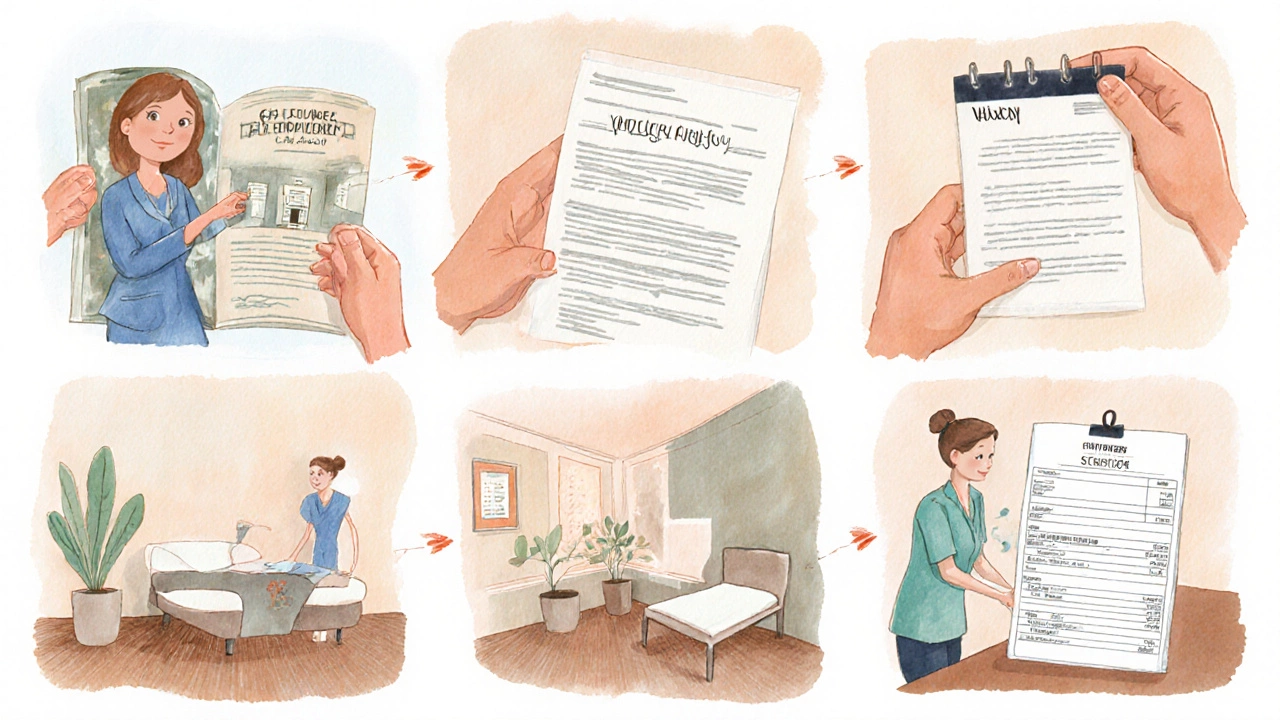Private Health Care Cost Calculator
Estimate Your Private Health Care Costs
Compare private health care costs with NHS options for common procedures. Select your procedure and payment method to see detailed estimates.
Cost Comparison Results
When you hear the phrase private health care, you might picture a sleek clinic, a fast‑track appointment, or a glossy brochure promising top‑tier treatment. But what does it actually mean? Is it just about paying extra to skip the line, or does it involve a whole different system of funding, providers, and patient rights? This guide breaks down the concept so you can see exactly what private health care entails, how it stacks up against the public system, and whether it’s the right choice for you.
Key Takeaways
- Private health care refers to medical services funded by individuals or private insurers rather than by the state.
- It offers faster access, choice of specialist, and often more comfortable facilities, but at a higher out‑of‑pocket cost.
- Understanding payment models-direct pay, private insurance, or mixed plans-helps you budget effectively.
- Comparing private care with the NHS highlights trade‑offs in waiting times, treatment range, and continuity of care.
- Key factors when deciding include your health needs, financial situation, and whether you value privacy and speed over universal coverage.
Defining Private Health Care
Private health care is a system of medical services that are financed through personal payments, private health insurance policies, or employer‑sponsored plans rather than through general taxation or national insurance contributions. In contrast to public health systems like the NHS, private providers operate on a commercial basis, meaning they charge for each service, appointment, or procedure. While the core medical procedures-diagnostics, surgery, medication-remain the same, the delivery model, funding source, and patient experience can differ dramatically.
How Private Health Care Works
Understanding the flow of a private health‑care journey helps you see where the costs and benefits arise.
- Choose a provider: You select a private hospital, clinic, or specialist based on reputation, location, and available services.
- Secure financing: This can be through direct payment, a private health‑insurance policy, or a mixed arrangement like a health‑savings account.
- Book an appointment: Private providers typically offer same‑day or next‑day slots, bypassing the lengthy waiting lists common in public care.
- Receive treatment: Services are often delivered in dedicated private rooms, with fewer patients per ward and a higher staff‑to‑patient ratio.
- Billing: After treatment, you receive an itemised bill, which may be covered fully or partially by your insurer.
Benefits of Going Private
Many patients opt for private care because it offers tangible advantages.
- Speed: Reduced waiting times mean you can see a specialist within days instead of months.
- Choice: You can pick a particular surgeon, hospital, or even a specific treatment centre that matches your preferences.
- Comfort: Private wards usually provide private rooms, better amenities, and a quieter environment.
- Continuity: You often see the same consultant throughout the treatment pathway, improving communication and follow‑up.
- Advanced options: Some cutting‑edge procedures or experimental therapies are first offered in private settings before entering public pathways.

Potential Drawbacks and Considerations
Private health care isn’t a one‑size‑fits‑all solution. Here are the most common concerns.
- Cost: Out‑of‑pocket expenses can be substantial, especially for complex surgeries or long‑term care.
- Insurance gaps: Not all policies cover every condition or procedure, leaving you with unexpected bills.
- Equity: Private systems can widen health disparities, as those who can afford care get faster access.
- Continuity with public care: If you later need NHS follow‑up, coordination between private and public providers can be tricky.
- Regulation: While private facilities are regulated, oversight can differ from the NHS, requiring careful provider research.
Cost Structures and Payment Models
Understanding how you’ll pay is crucial before committing.
| Payment Model | How It Works | Pros | Cons |
|---|---|---|---|
| Direct Pay | Pay for each service at the point of care. | No insurance paperwork; full control over spending. | High upfront cost; unpredictable expenses. |
| Private Health Insurance | Monthly premium covers a set of treatments, often with a deductible. | Spreads cost over time; many plans cover emergencies. | Exclusions and limits; premiums rise with age. |
| Employer‑Sponsored Plans | Employer contributes to a group policy; employees may pay a contribution. | Often cheaper than individual policies; tax‑advantaged. | Limited to job tenure; may not cover dependents fully. |
| Health Savings Account (HSA) | Pre‑tax money set aside for medical expenses; funds roll over year‑to‑year. | Tax savings; flexibility to choose providers. | Requires disciplined saving; not all employers offer. |
When budgeting, consider not just the treatment cost but also ancillary fees such as diagnostics, anaesthesia, and post‑operative care. A typical knee replacement in a private UK hospital can range from £12,000 to £20,000, while the same operation on the NHS is free at the point of use but may involve a 12‑month wait.
Private vs. NHS: A Side‑by‑Side Comparison
| Aspect | Private Health Care | NHS (Public) |
|---|---|---|
| Funding | Personal payments or private insurance. | Taxation and National Insurance. |
| Waiting Times | Often days to weeks. | Weeks to years for elective procedures. |
| Provider Choice | Select specialist, hospital, and even treatment centre. | Assigned based on regional NHS trust. |
| Facility Comfort | Private rooms, fewer patients, enhanced amenities. | Shared wards, limited private options. |
| Cost to Patient | Direct fees; varies widely. | Free at point of use. |
| Coverage of Experimental Treatments | Often available sooner through clinical trials or private research centres. | Typically accessed later, after NHS review. |
Both systems aim to deliver quality care, but their priorities differ. If you value speed and personal choice and can afford the fees, private health care may be a fit. If universal coverage and cost‑containment matter more, the NHS remains a solid backbone.

Choosing the Right Path for You
Here’s a quick decision‑tree to help you decide whether to go private, stay public, or blend the two.
- Do you need immediate treatment (e.g., urgent surgery, rapid diagnostics)?
- Yes → Private provider or private‑insurance plan.
- No → NHS may suffice.
- Is the procedure covered by your employer’s health plan?
- Yes → Use the employer‑sponsored plan.
- No → Evaluate personal insurance or direct pay.
- Do you have a chronic condition requiring long‑term specialist care?
- Yes → Private specialist may offer continuity and tailored follow‑up.
- No → NHS provides ongoing management at no cost.
Remember that you can also combine both: start with a private assessment for speed, then transition to NHS for long‑term management if it makes sense financially.
Frequently Asked Questions
What qualifies as private health care?
Any medical service paid for directly by the patient or covered by a private insurance policy, rather than funded through the state health system.
Can I use private health care for emergencies?
Yes. Private hospitals often have 24/7 emergency departments. However, in life‑threatening situations, the NHS remains the fastest nationwide option.
How does private health insurance differ from NHS coverage?
Private insurance pays for a set list of services, often with a deductible and limit per year. The NHS provides universal coverage without direct charges but may have longer waits.
Are private hospitals regulated?
Yes. In the UK, private hospitals must meet Care Quality Commission (CQC) standards, the same body that inspects NHS facilities.
What happens if I switch from private to NHS care?
Your private provider will share medical records with the NHS, allowing seamless continuation. However, you may re‑enter NHS waiting lists for any new elective procedures.
Next Steps and Tips
Ready to explore private health care? Here’s a short checklist to keep you on track:
- Identify your health priorities: speed, specialist choice, comfort, or cost.
- Research reputable private hospitals and clinics. Look for CQC ratings and patient reviews.
- Compare insurance plans: premium, deductible, coverage limits, and exclusions.
- Calculate total expected cost, including diagnostics, surgery, anaesthesia, and post‑op care.
- Speak with your GP or a private‑care liaison to understand referral pathways.
- Decide whether a hybrid approach (private for urgent care, NHS for long‑term) fits your budget.
Taking the time to map out these steps will ensure you get the care you need without unwanted surprises.





